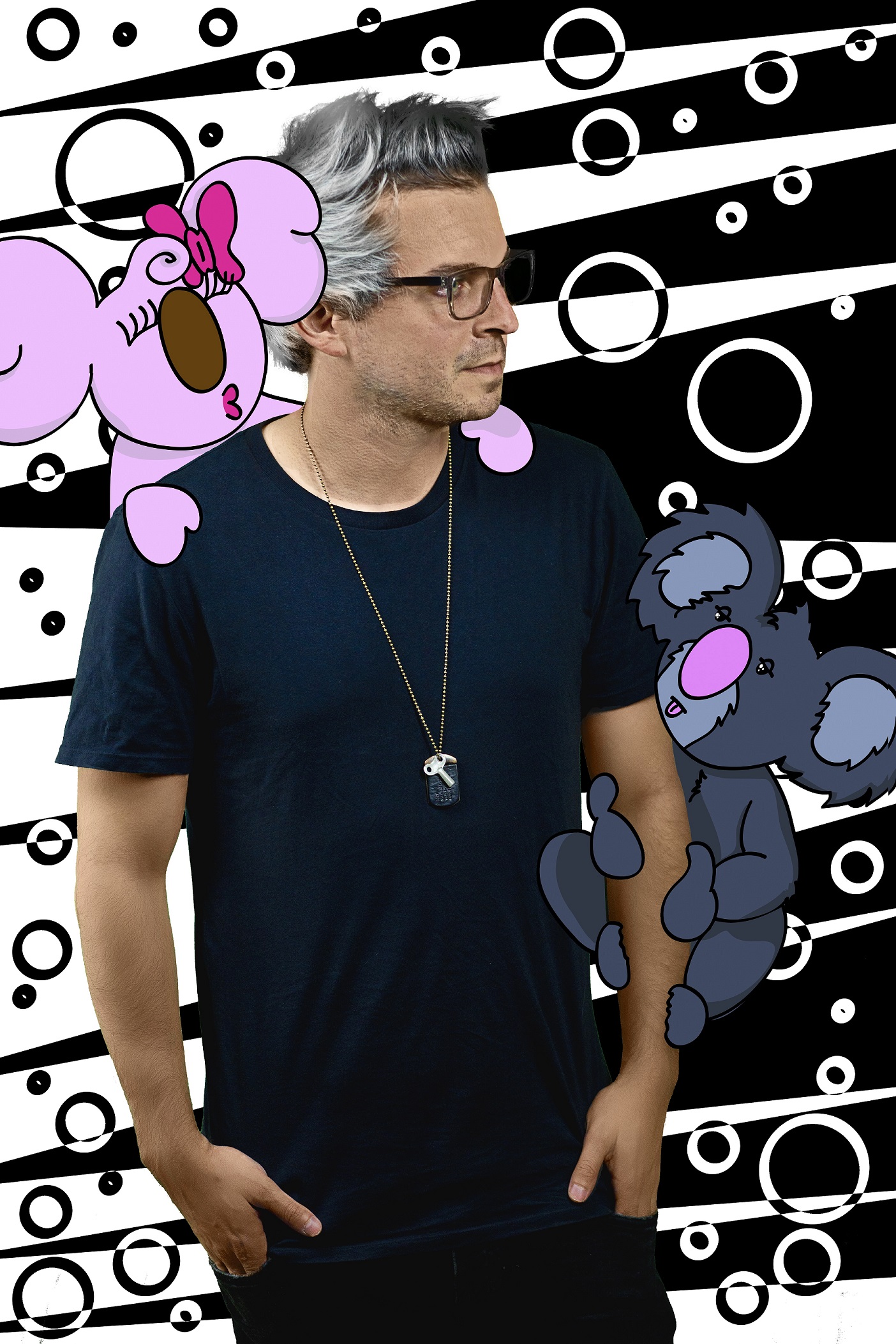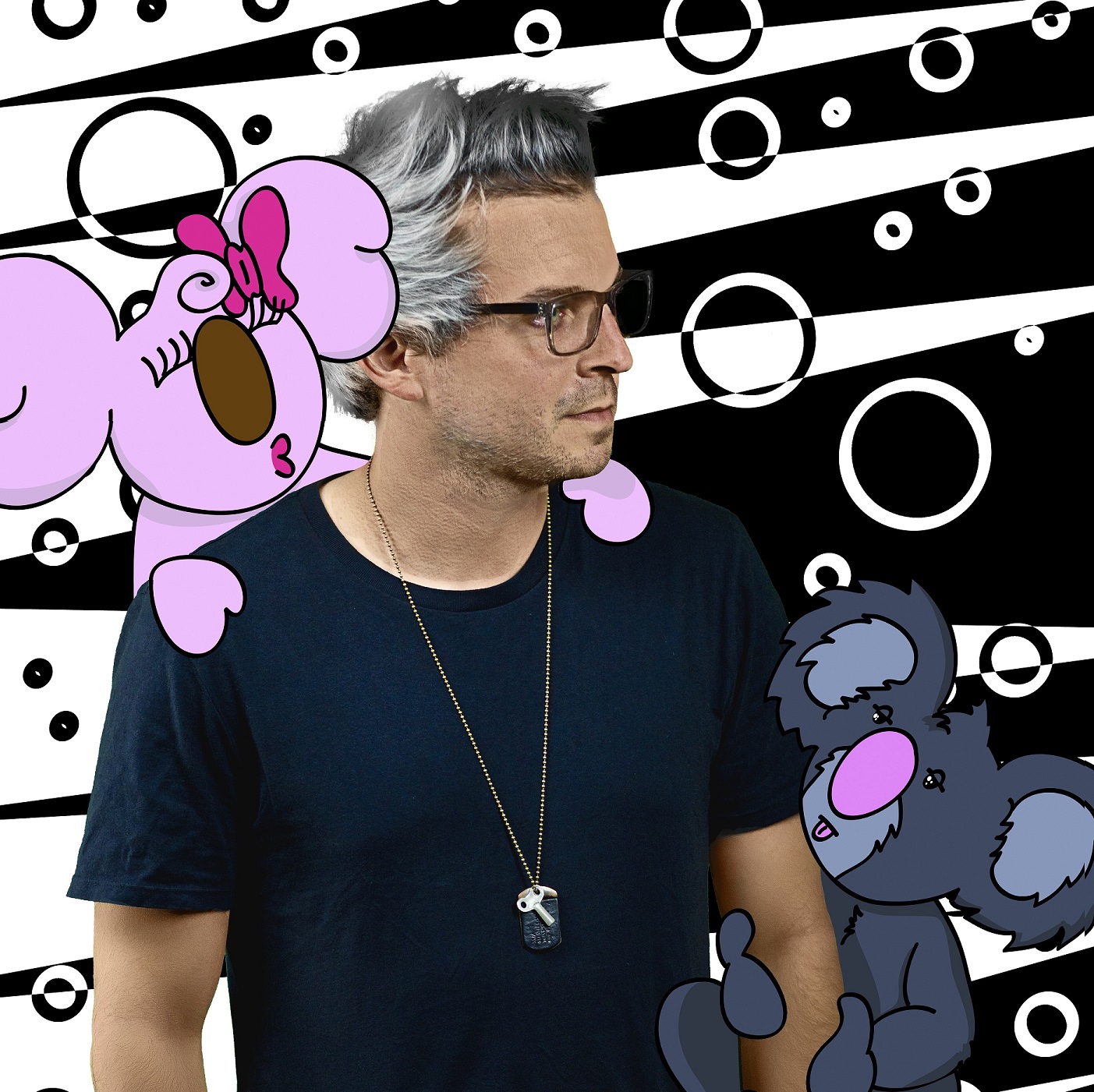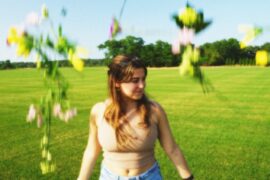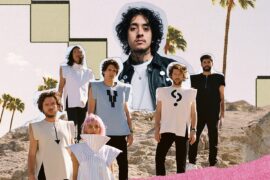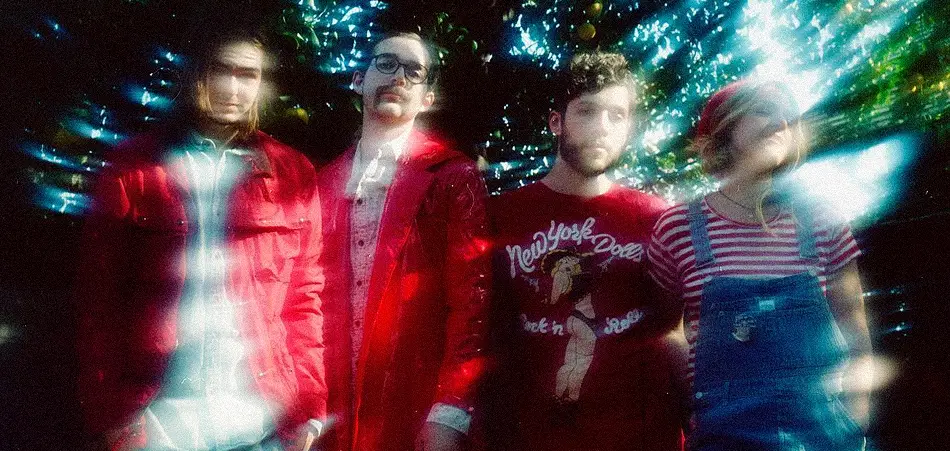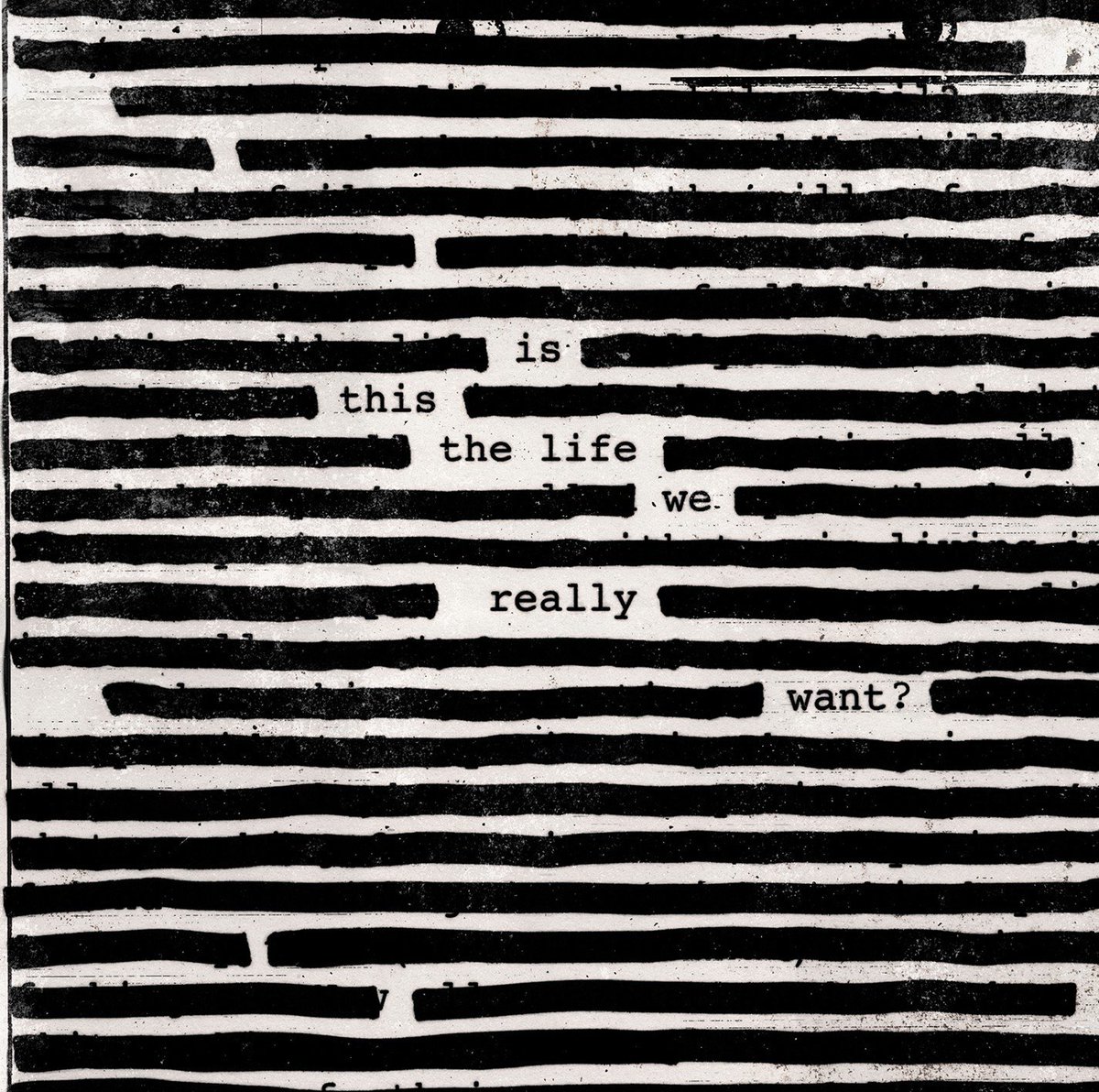It was just under a year ago that a mysterious new song dropped upon an unsuspecting internet. The song was called “Friend,” by an artist also named FRND. It was an emotionally heavy, melodically warm and mesmerizing mix of electronic production, pop lyricism, and human depth. Fun, but real.
Andrew Goldstein, the man behind the music, had no idea what he was getting himself into. Since pursuing the FNRD project, the seasoned pop songwriter and producer has released a steady flow of engaging, provocative material that has enchanted audiences around the world, racking up millions of streams on multiple platforms. Atwood Magazine previously featured the song “Be Happy,” calling it “a profoundly personal, intimate and heartfelt outpouring of emotion that cements FRND’s credibility as a true artist.” It’s all culminated in the release of FRND’s debut EP In Your Dreams (independently out 7/28/2017), and for Goldstein, it’s a dream come true.
Atwood Magazine had the exclusive opportunity to speak to FRND – aka Andrew Goldstein – on the eve of his debut EP’s release.
MEET FRND
So do I call you FRND, or Andrew?
FRND: (laughs) you can call me Andrew!
Let’s talk about the koala: You’ve previously called the koala “a version of yourself.” Can you talk about why you chose that as the logo for FRND?
FRND: Yeah! So, the first thing that came about was actually the song “Friend.” When I recorded it, I wasn’t really sure what it was yet, but I decided to release the song, make a project, and have this be the vibe of the project. That day, I was looking online and I saw this picture of a koala that looked like he was just sitting there, kind of stoned or something – chilled out and all weird – and I was attracted to this for some reason; it just had a magnetic appeal to me. I thought it was interesting, because it kind of became the symbol for my project in that moment, and it just made sense to me – it’s chill on the outside, and I’m a pretty chill person on the outside; but I feel like, me, with the music, there’s a lot more going on, as far as emotions and so forth. So the vibe of the music was kind of like staring off and being chill, while experiencing emotions on the inside – I wanted that.
So “Friend” the song dubbed the artist project FRND.
FRND: I kind of molded it around that. One day, when I’d figured out the koala, I kind of just chose to spell it F-R-N-D. And I sent that random picture of the koala to a friend of mine who’s graphic designer who ended up showing me the best solitaire app I’ve ever played, and I asked him to base a picture off this but to make it kind of a cartoon, and kind of a game, because I’m like a gamer as well. The next day, he sent me back the picture that’s become the logo.
The rest is history, and then it kind of just stems from that. I don’t know, I just like having that… it’s like another entity attached to the project, because thus far I’ve kept my identity hidden online, and so forth. But now with the EP release, we’re doing a reveal.
I don’t care that much about like, it has to be hidden. It’s kind of just a pain, too. It’ll be easier to connect with people too, because I’m just a person, like any other person. If you go to a show, it’s nice to talk to someone face-to-face, rather than be this entity. I think it’s a more positive way to connect with people to have the reveal connected with the koala.
Right, but of course it’s great that you were able to make people focus on the music.
FRND: That was an exciting part, because there were no preconceived thoughts to it. It was just, here are these songs, and I think that’s what was able to get me in the door with some of these playlists, Hype Machine stuff, blogs, and YouTube channels, etc – letting the music first speak for itself without a built-up persona or a big social media thing, and also without the structure of a corporate push, fancy photos and whatever. If you let the music stand out there, it allows people to choose if they want to get into it or not.
It’s great that in doing that, you were able to craft an identity.
It’s a new entity, which is great, versus switching over all my accounts to become this “other” person. It’s still 100% me, but it allows it to be a project – I compare it to Adam from Owl City; it’s still him, but his project is Owl City. That’s kind of how I see myself, in a way.
It’s been a while since you went out on a limb and did your own thing, am I right in that?
FRND: My main focus up to this point has been writing and producing pop songs, rock, dance, electronic, for other artists. There’s been quite a few acts whom I’ve been lucky enough to work with. But FRND is such a freeing project to have; when I first made the song “Friend,” I didn’t know who would really sing this, and I didn’t see it as someone else’s song. It pretty much was born out of that; when you’re writing for other people, there’s so many songs that don’t see the light of day, or things that can happen in the process… There’s so many thigns that can happen with a song, that its nice to make music where this is the song, this is how I want it to be presented, and have it come out.
It’s really freeing, in that way – but the most amazing thing is putting it out and seeing people connect with it. I made the music in my bedroom… I had emotions, I wanted to make them into a song, and someone’s hearing it and can relate to it. That’s always something you feel writing for other people, which is cool, but when it’s your own thing, it’s really rewarding.
What has surprised you about the FRND project so far?
FRND: With the first release of the song “Friend,” I was pretty shocked at the reaction because I thought no one would care. I did it for fun and to see if anyone would like it, and I was really lucky enough to get some people at Spotify put it on the New Music Friday playlist, and then it had really good looks with blogs, and people liked it on those sites, and on some big YouTube channels like Suicide Sheep and Cloud Kid, and Koala Control – really sweet guys that run music YouTube channels. I was shocked at the response, and as I released more music, I could see what people gravitated toward and what they didn’t.
The next one they really gravitated to was this song I released called “Substitute,” which is my most-streamed song on Spotify thus far. It’s cool seeing what people react to. The last one, “Be Happy,” also had a really great reaction.
That kind of put me in a position to release this EP, which is called In Your Dreams, and it’s comprised of the four songs I put out, plus two new songs. It’s been an interesting journey – I didn’t even think of it as a thing where I would be able to put out albums or something, but it’s become this outlet for me, which is really great and rewarding. I’m going to do this EP, and hopefully another one or an album next!
This all happened by surprise.
FRND: It’s awesome though, because at the end of the day, the main focus is getting music out there and having people like it… I think every musician’s goal (in some way) is for your music to affect as many people as possible; that’s at least what my goal is. I want it to be something that people could relate to.
Before FRND, did you ever think you would go back to being the one behind your songs?
FRND: You know what, I wasn’t too sure I was going to again! I played in a band called Friday Night Boys on Fueled by Ramen from 2008 to 2010. We toured, did the whole thing, and it was super intense. Afterwards when I started writing and producing, I decided I was going to do this, and it’s really fulfilling. I think what ended up happening was that there were a couple things… one of those moments, a moment of desperation in a way, where I had worked on a project for a while, and it ended up not coming out for whatever reason. It was songs – hours and hours of days of working on stuff, and lyrics, and crafting stuff. To not have it see the light of day was a huge let-down, and it happens often, but there were one or two projects it happened on, so when I made another song I needed to make sure it came out, in some way. That’s really kind of how I got back into it; I didn’t really expect to be an artist again, but the one thing I wanted to make sure was that, when I did it this way, it was what I wanted to do, I could be who I wanted to be – I’m not trying to be like artist A or artist B; I can literally just do what I feel like doing, dress in the clothes I want, have the hairstyle I want, etc. The world I came from was very conforming; if something’s proven to work, people try to repeat that, whatever it may be – but there are many paths to success; it’s a crazy, winding road. A lot of people have done it in different ways, when before that people didn’t think it was possible, you know?
The first few songs you were making that defined the project as you went along, were songs that were so important to you, that they couldn’t get lost in the mix. That they were so near and dear to you, that they had to be released, no matter what.
FRND: Correct – yeah, I just felt such a strong connection to them. They were super real; I tried to keep all of these songs I’ve done for this, as about being real things that happened to me – real emotions. These songs came about after an event happened to me, and then I went home and wanted to write a song, because I needed to write about this – because it’s what has been running through my head. What you dream about, think about, all that stuff. I just wanted to keep it real. It’s my story!
And you can feel that. I think the biggest theme on this album is hardship resulting from relationships, which is something that everybody can speak to, but it’s not like these are love song. In fact, most of them come from a very different place.
FRND: Exactly. The EP was kind of encapsulated with that. I come from the background of emo/pop punk world stuff, and usually those themes are pretty common there. I was going through a breakup and some other tough moments… The song “Friend” is about a fake friend – someone you think is your friend, and they turn out not to be, and you want them out of your life. The song “Substitute” is like being in love with a girl who has a boyfriend, and you feel a connection with her and she feels a connection with you, but you’re not sure where you stand. “Be Happy” is about the end of a relationship, where you realize you’ve been through pain and hurt, and you’re not sure if you want the person back or not, but in the end, coming to the realization of that cliché quote, I hope you’re happy, even if you don’t end up with me in the end; it’s acceptance of the end, and moving on.
I want to dig into this music even further. Can we go through the EP one by one?
FRND: Of course!
Friend
FRND: It was a real event that happened. Pretty much what happened is there was a guy friend of mine, a regular friend. I was hanging out with this girl at the time, and I was going to go meet up with her, and he called me up asking if he could join. I said sure, but I told him I was interested in this girl and asked if he could be my wingman, and he said of course. But he went, and was flirting with her – it was like he was anti-wingmanning me! It was shocking, and I thought it was so backstabbing. I thought he was a close enough friend, where he wouldn’t have an every-man-for-himself mentality. I realized this guy was not my friend at all, so I decided to cut him out of my life entirely – and that’s what “Friend” is about: You think you trust this person and will be there for you, and it turns out they wouldn’t. So you turn to your real friend who will be there for you.
Does making a song like “Friend” help to heal the wound?
FRND: It really does! When you’re able to express everything and have people hear it and enjoy it, it turns the event into a good thing, rather than a bad thing you look at. I’ve pretty much forgiven the guy, but I’m still not going to be his friend; I have no interest! But it helps a lot: Even though that sucked happening – it wasn’t a fun moment – it allowed me to create this thing that other people can enjoy, and if they enjoy it, that makes me enjoy it. So it is kind of like a Band-Aid, in a way!
“Friend” is also really good because it introduces part of your signature style: The post-chorus melody.
FRND: (laughs) Right! Totally, kind of like a post-chorus drop, melodic instrumental section.
You love the post-chorus melody!
FRND: (laughs) Yeah! At least for this EP, I tried to keep the songs having a similar structure, so they felt like they were of the same body of work.
Where did that come from, for you? You really blend all these genres and worlds together.
FRND: It’s kind of interesting… you know, the chords are still pretty much the same thing; it’s just presenting it in a slightly different way, different drums and sounds. My voice sounds sort of in that emo/pop-punky realm, which is just how I learned to sing; so I think it’s kind of like doing the same thing, just in a different way. And I don’t need an entire band to record the songs, which is nice!
Movies
FRND: The song is pretty much about looking back at the end of a relationship: When you go into a relationship, you don’t know where it’s going to go; you have aspirations, but you don’t know if you’re going to end up happily ever after, getting married, or nicely breaking up or having it be a harsh breakup. So it’s kind of looking back on a relationship and going, shit! That was more real than watching a movie, because you feel it – you actually felt it! And it’s also about not completely being over the fact that it’s over. Even though the credits have rolled, you want to live in it, still.
The first thing I made of the song, I had the chords and I made the drop. I found a random recording on this free sounds website, where hobbyists just upload sounds for free. It was a baby or infant kind of talking, sort of. I ended up putting it in the program, and I moved the pitch around and made the drop be this baby talking in a melody sort of thing. That’s the first thing I had… I was throwing around this title, “Movies,” and the first thing I had of the lyrics was the pre-chorus. So I had that, and I put the track on my phone and I was driving in my car, and I started humming what became the chorus part. That connected the concept of the song for me, and then the last part of the chorus – “I don’t mean to, but I still need you,” sort of wraps it up. I don’t want to keep living in that place, you know? But I still do; I still want to.
One of the things I love about it are these melodic scats that you do. What’s going on there?
FRND: The vocal glitching is my voice, pretty much. In the production, you can chop it up or shift the pitch a bit. I kind of like using that as a melodic and rhythmic tool, rather than writing more lyrics or making up another part. You can kind of use it as an instrument, not just for lyrics and melody, but also for other sounds. Instead of the “whoa’s” or whatever it might be.
Sticks and Stones
FRND: I was sitting in the studio one day, and I had made the part, “Sticks and stones may break my bones, but you could never hurt me,” and I thought that was interesting: You’re not going to hurt me this time. The concept of the song is you telling yourself you’re done with feeling bad, and allowing this person to get to you –
When obviously, this person keeps getting to you.
FRND: Yeah, no matter how high up you build your walls or how powerful your shield is. I had that hook, and pretty much sat down one day and saw the idea through. I liked the self-talk aspect, and thought, what would I do if I had this feeling? Ultimately you’re not going to be able to shut them out until time heals it and you’re able to deal with it.
Substitute
Why do you think this song is your most streamed?
FRND: I think it’s the lyrics and the concept; it’s very literal, and kind of a direct message to the person. It’s a little more literal than the other songs I’d written up to that; it opened up my writing style for some of the other songs, because it’s so on the nose – more-so than I would usually write. If you read the lyrics all the way through, it makes sense and doesn’t leave anything up to the listener. It literally says what the song is about in the lyrics. It reminds me of being in the style of an emo song, except for being presented in another way with the electronic beat, but I think the main thing people connect with is the clarity of the lyric.
Soap
FRND: I believe I wrote “Soap” either right before or right after “Substitute.” I’ve had it for a few months sitting here, and I’m glad I’m able to put it on this EP. “Soap” is interesting, because it employs this rolling of the knuckles on the piano. It’s one of the first things you learn as a kid to play on the piano, and I just thought to start with the music like that. That song is sort of similar in concept to “Sticks and Stones;” I had just gone through a breakup at the time, and you know, you go through the motions of trying to forget about someone or move on. You’re still dreaming about them; you’re still thinking about them, but even though those things are happening, you’re going to still try to go through the motions of getting past this point in your life – at least mechanically – so hopefully the emotional side can follow. “Dreaming of you”… I kept having these reoccurring dreams of still being together and all this stuff, and it was haunting. I could deal without that! When you’re trying to get over something, you don’t want to keep thinking about it, but then when you have dreams about, it’s like you relive it all of a sudden. That’s what makes it hard to let go. How do you know when you finally let it go? It’s just hard to find that place, until you can finally reach that place.
Be Happy
Why did you end with this song?
FRND: It’s conclusive to the concept of this EP, because a lot of the EP is going through this emotional distress and torment and heartbreak, and not getting over stuff and trying to get past stuff. “Be Happy” is so interesting because I wrote it in one night, pretty much; I was just sitting with the guitar on my couch, and it all came together fast. When I was writing it, I had finally felt this feeling of acceptance after I’d got these other songs out. I felt like I could finally accept that all this stuff I went to, leading up to this moment, was good in the end, because it allowed me to make this music. Making the music and getting it out there was very therapeutic for me to deal with everything. That idea of acceptance is the final stage of loss, and I saw “Be Happy” as the final statement of what this EP is, and what the concepts of the songs are. Now, after this, I’m ready to move on to different concepts and different styles of songs – still similar themes and stuff, but to expand into other concepts other than the concept of loss, and letting go, or not letting go.
What would you love people who are hearing you for the first time to take away from this?
FRND: I would like people to enjoy listening to it; I hope they can relate to it, especially if people have been in, or are in similar circumstances: Just know that, I’ve been there too! It’s a common thing that happens to a lot of people, and they’re not alone out there wondering why me, why me or whatever it is. It’s something they can relate to and feel for! I know when I hear songs that have lyrics where I think oh my god, I’ve literally been through that, it makes me feel like I’m not alone; wow, this dude felt the same shit I did, so that makes me have a connection to them. I hope people can have a connection to the music and to what I felt, and that it can help them feel better, at the end. And if they’re going through some shit, they’re going to be able to get through it, because I’ve also gone through that – you know?
It’s been a wild ride, Andrew Goldstein, on the way to releasing your own (for all intents and purposes) solo, debut EP!
FRND: Yeah, it’s pretty crazy and really eye-opening. It’s the beginning, luckily, you know? The beginning of a new path, really – and a new journey. I’m anxious to see where it takes me, and I hope people relate to the music and that they can feel it. That’s what’s most important.
Looking back, would you do anything differently?
FRND: Probably not, honestly. I’ve been pretty happy so far, and I hope it keeps going in the direction it is. I think the thing I’m most proud of really, with this, is just kind of being myself: I’m completely myself, the songs are completely myself, I’m not trying to be anyone else or model after anyone else’s style… Kind of just making literally what I’m feeling. I’ve been really proud of that fact. At the end of the day, I think – you know, a lot of with life, you’re kind of on this journey to figure out exactly who you are, and I think this is really nice, comforting and enjoyable to kind of do what I feel like – who I am, and be real.
— — — —

Connect to FRND on
Facebook, Twitter, Instagram
Discover new music on Atwood Magazine
photo: FRND © 2017
:: Listen to FRND ::
